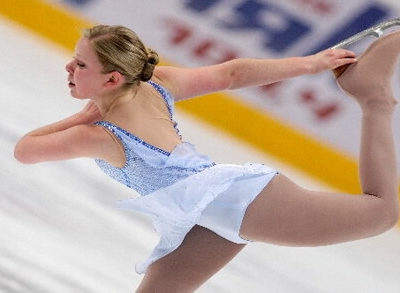With exams, sports practices, internships and extracurricular activities, students are under a daunting amount of pressure to succeed. Imagine all your current responsibilities compounded with the ultimate sporting honor: a spot on the U.S. Olympic team.
All before the age of 20, Olympic figure skater Rachael Flatt managed to balance school, practice, competition and play during her senior year of high school. In the fall, Flatt will be attending Stanford University and plans on studying chemical engineering. We checked in with this Olympic star to see how she manages to do it all.
When did you start figure skating?
Four-years-old in California, we were at a local rink in the mall getting my grandfather a birthday present. I got some skating lessons too.
When did you decide to take it to a competitive level?
It was just recreational at the beginning, to get rid of some of her extra energy. I started competing at the age of 6 or 7, I went to the junior nationals at 9, and the U.S. national championships at 12.
How do you deal with growing up in a sport with the pressure to do exceedingly well at such a young age?
Naturally skating is a young sport, for me it’s helped me to be accountable for my actions. I’ve certainly grown up and matured because of skating but passion has beena key factor to continue to skate and love it throughout [my career]. It’s difficult to grow up in the sport with so much pressure, especially making the team under the age of 20. It’s more interesting for me to see how the more experience skaters deal with the pressure [of competing against a younger generation]. I’m able to enjoy it and not treat it strictly as business.
What was it like competing in the Olympics?
It was just incredible. I had a wonderful time meeting so many other athletes who are just as determined as I am to compete their best. Seeing how driven they all were was incredible. From the opening to the closing it was so exciting.
How did you prepare mentally for the Olympics?
I have competed in the Pacific Coliseum arena before so I was able to visualize the arena and envision what I thought the experience might be. Fortunately it was very different [actually competing] because the audience made it much more exciting. I tried to keep it as normal as I could, accepting the situation and embracing it.
Watching your long performance you looked so excited—how did you feel when you were skating?
I was feedng off how positive and enthusiastic the audience was, it was just incredible. I was just enjoying every second. Knowing I trained so hard going into the Olympics, I was able to put my mind at ease. I was so excited I felt like jumping out of my skin. It was the time of my life, a once in a lifetime opportunity.
But you didn’t get the technical scores you wanted, how did you feel after?
Based on how I thought I skated I thought they would b a little higher. I certainly respect the judges decision and the technical panel as well. It’s something to keep me driven.
How did you manage your school workload while you were in Vancouver?
It has been stressful coming back from the Olympics with all the make-up work I had. I couldn’t work a lot on it while she was there, it was an incredible experience. I’ve been preparing for worlds since I’ve been back but it’s been fun catching up with my friends.
Were you able to enjoy any of the other games or take a break?
I saw the alpine skiing events at Whistler with my roommate Emily Hamilton who skates with Evan Bate. I got tickets to the U.S.A., Canada hockey game which was really exciting. It was incredible when the U.S. scored the second goal. There was a lot of anxiety there for the overtime. I also really liked speed skating, it’s much faster in person than on TV.
Photo: http://blog.cleveland.com/skating/2009/01/large_Rachel-Flatt.jpg



















